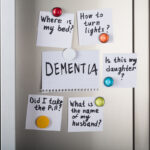Clarissa Giebel
Dr Clarissa Giebel is Senior Research Fellow at the University of Liverpool, and her research focuses on enabling people with dementia to live well and be independent at home for longer. She is particularly interested in addressing inequalities in accessing and using post-diagnostic dementia care, both nationally and internationally. Passionate about making research easily accessible for everyone, she is hosting the Liverpool Dementia & Ageing Research Forum and her own science podcast The Ageing Scientist (link: https://theageingscientist.podbean.com/).










